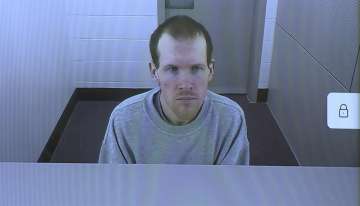The man who committed the worst atrocity in New Zealand’s modern history when he slaughtered 51 worshippers at two Christchurch mosques unexpectedly pleaded guilty to all charges Thursday. The attacks targeting people praying at the mosques a year ago shocked the nation and prompted new laws banning the deadliest types of semi-automatic weapons. It also prompted global changes to social media protocols after the gunman livestreamed his attack on Facebook, where it was viewed by hundreds of thousands of people.
The sudden turn in the case took survivors and relatives by surprise, and brought relief to people across New Zealand. Many had feared Australian white supremacist Brenton Harrison Tarrant would try to use his trial as a platform to promote his views. He’d outlined those views in a 74-page manifesto he published online shortly before the attacks.
Tarrant, 29, pleaded guilty to 51 counts of murder, 40 counts of attempted murder and one count of terrorism at the Christchurch High Court. He had previously pleaded not guilty to all charges and his trial had been scheduled to start in June.
Tarrant is the first person to be found guilty of terrorism in New Zealand under laws passed after the Sept. 11, 2001, terrorist attacks in the U.S.
The change in plea came less than two weeks after New Zealanders commemorated those who died during the attacks on March 15, 2019.
“Honestly, I’m still trying to process what just happened,” said Aya Al-Umari, whose brother Hussein was killed in the attack on the Al Noor mosque. “I feel conflicted.”
She said that on the one hand, she had wanted to find out more details about what happened at the trial but on the other hand was feeling relieved about not having to face the trauma of sitting through it.
Temel Atacocugu, who survived being shot nine times during the attack at Al Noor, said he was surprised by the turn of events and hoped the judge would set an example at the sentencing by imposing the harshest punishment in the country’s history and helping ensure nothing like it would happen again.
“I’m happy that he has accepted that he is guilty,” Atacocugu said.
,Judge Cameron Mander has not yet set a sentencing date. Tarrant faces life imprisonment, with the judge having some discretion in deciding the minimum number of years Tarrant must serve before becoming eligible for parole.
The change in plea came at a hastily arranged court hearing at a time that New Zealand was beginning a four-week lockdown to try and combat the new coronavirus. The lockdown meant Tarrant appeared in the court via video link from his jail cell in Auckland and only a handful of people were allowed inside the courtroom.
Latest World News

